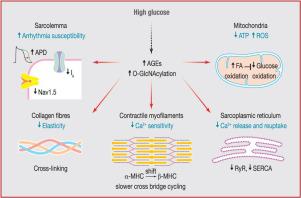Archives of Cardiovascular Diseases ( IF 2.3 ) Pub Date : 2021-10-06 , DOI: 10.1016/j.acvd.2021.08.004 Magali Samia El Hayek 1 , Laura Ernande 2 , Jean-Pierre Benitah 1 , Ana-Maria Gomez 1 , Laetitia Pereira 1

|
Diabetes mellitus is a metabolic disorder with a chronic hyperglycaemic state. Cardiovascular diseases are the primary cause of mortality in patients with diabetes. Increasing evidence supports the existence of diabetic cardiomyopathy, a cardiac dysfunction with impaired cardiac contraction and relaxation, independent of coronary and/or valvular complications. Diabetic cardiomyopathy can lead to heart failure. Several preclinical and clinical studies have aimed to decipher the underlying mechanisms of diabetic cardiomyopathy. Among all the co-factors, hyperglycaemia seems to play an important role in this pathology. Hyperglycaemia has been shown to alter cardiac metabolism and function through several deleterious mechanisms, such as oxidative stress, inflammation, accumulation of advanced glycated end-products and upregulation of the hexosamine biosynthesis pathway. These mechanisms are responsible for the activation of hypertrophic pathways, epigenetic modifications, mitochondrial dysfunction, cell apoptosis, fibrosis and calcium mishandling, leading to cardiac stiffness, as well as contractile and relaxation dysfunction. This review aims to describe the hyperglycaemic-induced alterations that participate in diabetic cardiomyopathy, and their correlation with the severity of the disease and patient mortality, and to provide an overview of cardiac outcomes of glucose-lowering therapy.
中文翻译:

高血糖在糖尿病心肌病发生发展中的作用
糖尿病是一种具有慢性高血糖状态的代谢紊乱。心血管疾病是糖尿病患者死亡的主要原因。越来越多的证据支持糖尿病心肌病的存在,这是一种心脏收缩和舒张受损的心脏功能障碍,与冠状动脉和/或瓣膜并发症无关。糖尿病心肌病可导致心力衰竭。几项临床前和临床研究旨在破译糖尿病心肌病的潜在机制。在所有辅助因素中,高血糖似乎在这种病理中起重要作用。高血糖已被证明通过几种有害机制改变心脏代谢和功能,如氧化应激、炎症、高级糖化终产物的积累和己糖胺生物合成途径的上调。这些机制负责激活肥大途径、表观遗传修饰、线粒体功能障碍、细胞凋亡、纤维化和钙处理不当,导致心脏僵硬以及收缩和舒张功能障碍。本综述旨在描述参与糖尿病心肌病的高血糖引起的改变,及其与疾病严重程度和患者死亡率的相关性,并概述降糖治疗的心脏结局。导致心脏僵硬,以及收缩和舒张功能障碍。本综述旨在描述参与糖尿病心肌病的高血糖引起的改变,及其与疾病严重程度和患者死亡率的相关性,并概述降糖治疗的心脏结局。导致心脏僵硬,以及收缩和舒张功能障碍。本综述旨在描述参与糖尿病心肌病的高血糖引起的改变,及其与疾病严重程度和患者死亡率的相关性,并概述降糖治疗的心脏结局。











































 京公网安备 11010802027423号
京公网安备 11010802027423号